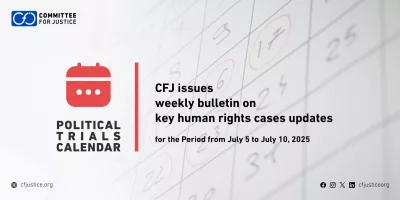The Committee for Justice (CFJ) stated that the use of universal criminal jurisdiction is a crucial legal tool for prosecuting perpetrators of enforced disappearances, particularly in cases where national authorities fail to achieve justice or refuse to hold perpetrators accountable. CFJ explained that this mechanism allows national courts in any country to prosecute individuals involved in such serious crimes, regardless of where they were committed or the nationality of the perpetrators and victims. This contributes to combating impunity and sends a strong message that the international community will not tolerate grave human rights violations.
This comes as part of CFJ’s submission of its report regarding the research being conducted by the United Nations Working Group on Enforced or Involuntary Disappearances on the use of universal criminal jurisdiction in cases of enforced disappearance. The report is scheduled to be presented to the Human Rights Council in September 2025. This significant initiative aims to assess the application of universal jurisdiction in addressing these grave violations, identify challenges, draw lessons learned, and highlight best practices that enhance accountability and justice.
In preparing this report, CFJ relies on its extensive experience in documenting and combating enforced disappearances in North Africa, particularly in Egypt and Sudan. The report also draws on a diverse range of public sources, including international and regional conventions, the jurisprudence of UN human rights mechanisms, and reports and analyses from other organizations. CFJ emphasizes its continued commitment to combating impunity and ensuring justice for victims of enforced disappearance and their families.
CFJ’s report argues that although the principle of universal jurisdiction allows states to prosecute perpetrators of certain crimes regardless of where they were committed or the nationality of the perpetrators or victims, it has not been practically applied in Egypt or Sudan. Neither country has prosecuted perpetrators of serious crimes based on this principle, nor, to the best of CFJ’s knowledge, have any cases been initiated against foreign perpetrators within their territories.
This situation reflects structural, legal, and political obstacles that hinder the application of universal jurisdiction in both countries. The report highlights these challenges, noting that both Egypt and Sudan face significant internal difficulties in holding those responsible for grave human rights violations accountable due to weak legal and institutional systems.
CFJ’s report underscores that systematic impunity is one of the main obstacles to achieving justice in cases of enforced disappearance. The conflict in Darfur is a striking example of this issue in Sudan. Although Sudan joined the International Convention for the Protection of All Persons from Enforced Disappearance (ICPPED) in 2021, its domestic legal framework still lacks explicit provisions allowing for the prosecution of these crimes under universal jurisdiction. Moreover, the special courts for Darfur, established in 2005 to prosecute perpetrators of serious crimes, have failed to deliver effective justice due to political interference and a lack of judicial independence.
In Egypt, the country has not adequately incorporated its obligations under the ICPPED into domestic laws. Egyptian law does not comprehensively criminalize enforced disappearance, nor does it contain explicit provisions for applying universal jurisdiction. Additionally, the Egyptian judiciary—heavily influenced by the executive authority—shows no willingness to prosecute those responsible for these crimes, further reinforcing a culture of impunity. CFJ has documented more than 633 cases of enforced disappearance in Egypt so far. Meanwhile, Egyptian authorities continue to deny responsibility for these violations, obstruct investigations, and target human rights defenders and journalists.
The report also argues that the obstacles go beyond the mere absence of legislation; they extend to the lack of judicial independence, making it nearly impossible to prosecute perpetrators of serious crimes under universal jurisdiction. In Egypt, the judiciary hesitates to try government officials, while emergency laws and anti-terrorism legislation are used to protect perpetrators rather than hold them accountable.
In Sudan, the 2021 military coup and the ongoing turmoil since April 2023 have further undermined any potential efforts to ensure fair trials for war criminals and those responsible for enforced disappearances. Additionally, the hostile human rights environment in both Egypt and Sudan obstructs victims’ efforts to seek justice. Survivors, lawyers, and human rights defenders face intimidation and harassment, preventing them from filing complaints or participating in investigations.
Regarding the participation of victims and civil society organizations in investigations and trials, there are no mechanisms to ensure their effective involvement in cases brought under universal jurisdiction. In both Egypt and Sudan, victims face severe risks such as harassment, arbitrary detention, and defamation, making it difficult for them to testify or provide evidence against perpetrators. Human rights organizations and lawyers working in this field also face restrictions and threats. For instance, Egyptian activist Ibrahim Metwally was arrested for his work in defending victims of enforced disappearance.
As for the protection of victims and witnesses and the provision of psychosocial support, both Egypt and Sudan lack official mechanisms to ensure their safety. In Egypt, victims and their lawyers face serious risks, including security persecution, media smear campaigns, and arbitrary arrests, making it difficult for them to pursue cases or cooperate with international courts. In Sudan, the ongoing conflict has exacerbated the security situation, making it dangerous for victims and witnesses to engage with justice mechanisms without fear of retaliation. While some civil society organizations attempt to provide protection and psychological support, these efforts face major challenges, including a lack of resources and continuous government repression.
In conclusion, CFJ affirms in its report that under the current circumstances, it is unlikely that the Egyptian and Sudanese governments or their judicial institutions have the capacity or political will to accept cases under universal jurisdiction or provide the necessary protection for witnesses and victims. Both countries have shown blatant disregard for international and domestic laws, allowing enforced disappearance to persist as a systematic policy without accountability.
Nevertheless, CFJ stresses that universal jurisdiction remains a key tool in the fight against impunity. Past cases, such as the conviction of Argentine officers in Spain (2007) and the trials related to Pinochet’s rule in Chile, have demonstrated that justice is possible even in seemingly insurmountable cases. Therefore, the international community must enhance the use of universal jurisdiction as a mechanism to hold perpetrators of serious crimes accountable in Egypt and Sudan and encourage states with relevant legal frameworks to initiate serious investigations into these cases to ensure justice.






